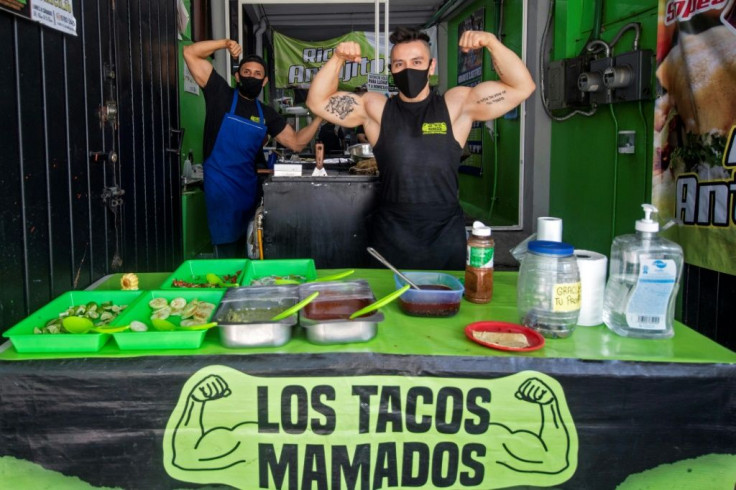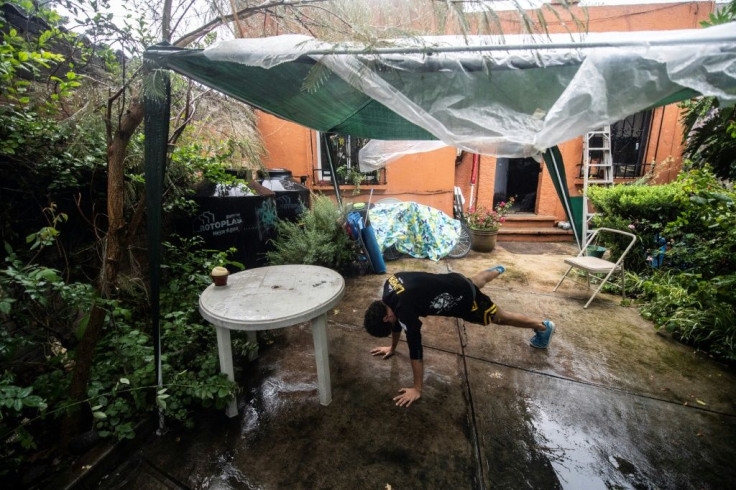Virus-wracked Mexico Struggles To Get In Shape
With martial arts training on rooftops, virtual exercise classes and outdoor workouts, Mexicans are getting creative as they try to slim down during the pandemic in one of the world's most obese countries.
In the urban jungle of Mexico City, Luis "Lucho" Romero follows his Muay Thai boxing lesson through a cellphone hanging from a tree in his backyard.
"Back straight, Lucho! Alicia, go down more slowly! Come on, just five more seconds and the last round!" instructor Alejandro Ortega shouts at his students from in front of a video camera.
Mexico has the world's third-highest coronavirus death toll -- and the government says poor diets and health problems including obesity, hypertension and diabetes are partly to blame.

Social distancing measures mean gyms remain closed in much of the country six months after the outbreak began, posing a major hurdle to efforts to get Mexicans in shape.
"It's incredible that the bars are open and exercise is almost going underground, because there are gyms that open secretly," Romero, a 27-year-old physiotherapist, tells AFP.

Mexico has the world's highest obesity rate among children and the second-highest among adults, according to the government.
Around one-third of Mexican children and three-quarters of adults are overweight or obese, increasing the risk of health problems such as diabetes and heart disease.
"Obesity is also an epidemic," warns deputy health minister Hugo Lopez Gatell, who oversees the fight against a virus that has killed more than 60,000 Mexicans.
A quarter of those who died were overweight while nearly three-quarters had at least one underlying health condition such as hypertension, diabetes and obesity, official figures show.

Sedentary lifestyles and consumption of processed foods have only increased during quarantine, according to a survey by the country's health authorities.
Half of respondents said they consumed sugary drinks, sweets and processed fried foods, while the proportion who did no physical activity increased from 3.6 percent to nearly 25 percent.
"People are consuming ultra-processed foods that are high in sugar, salt and calories, and sadly we have set aside natural foods," says Catalina Medina, expert at the government's Center for Research in Nutrition and Health.
The government is trying to encourage healthy eating with warning labels on foods high in sugar, sodium or fat.
Two states, Oaxaca and Tabasco, have gone even further by banning the sale of junk food to children, while several others are considering similar steps.
But the economic crisis unleashed by the pandemic means even some fitness fanatics are embracing fast food.
David Lopez and his business partners turned their gym in Mexico City into a restaurant where muscle-bound trainers who once gave tips on pumping iron now serve tacos instead.
"We became what we swore to destroy. Before we helped people burn calories, now we sell calories," says the 39-year-old.
Nearly a third of gyms have closed definitively in a country where only 3.5 percent of the population are members of sports centers, according to Rodrigo Chavez, president of the Mexican Association of Gyms and Clubs.
"The armchair is Mexico's greatest enemy. By not allowing us to open, people will become even more obese," he warns.
© Copyright AFP 2024. All rights reserved.





















